

CYC-Net: CYC-Online. Practice Respectful discipline: The control game — exploring oppositional behavior Autonomy carried to its extreme gives rise to oppositional behavior where a youngster refuses to be controlled by anybody.
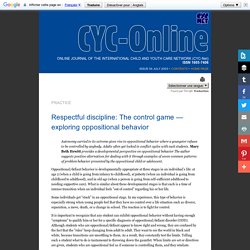
Adults often get locked in conflict cycles with such students. Mary Beth Hewitt provides a developmental perspective on oppositional behavior The author suggests positive alternatives for dealing with it through examples of seven common patterns of problem behavior presented by the oppositional child or adolescent.
Worthless Teenagers And The Parents Who Make Them - Part 2. Do you not get that the world is waiting for them with open jaws, ready to chew them up and spit them out, and that it will not hesitate any time it has the opportunity to do so?

Do you not get that around every corner lies hard and inescapable lessons for your teenager? Do you not get that the last place from which your teenagers need to be getting this kind of crap is from you? In your home? Adult Child Moving Home. This site is designed to assist parents who find themselves in the not-so-unique position of having an adult child moving back home with them (or one that has never left).

How To Love Your Boomerang Child. When should your children move out — and stay out?
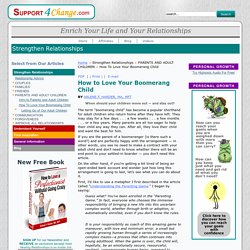
The term “boomerang child” has become a popular shorthand for adult children who return home after they have left. They may stay for a few days . . . a few weeks . . . a few months . . . or a few years. Many parents are all too eager to help their child any way they can. Tips for dealing with adult children living at home. How to handle adult children at home that refuse to respect rules. Making Peace in Dysfunctional Families: How to Fix It and Whether You Should « The Spiritual Eclectic The Spiritual Eclectic. Genuinely enjoying one another’s company. A family outing to Grayton Beach, with Lorna, Aislinn, Shannon, and Brian. All photos copyrighted. In every dysfunctional family, there’s at least one do-goodin’ peacemaker who is either a blood relative, an in-law, or a “concerned family friend.” Ironically, it’s usually not so much about making peace among hostile relatives but about being a hero—even through manipulative tactics designed to force everyone to make nice that really achieves nothing below the surface.
At least, that’s how it has been in my family…over and over and over again. I grew up in a dysfunctional family. They say blood is thicker than water, but in my family, so is toothpaste. Aspects of Dysfunctional Families. Dysfunctional Families: Recognizing and Overcoming Their Effects "As a kid I was like a miniature adult.

[FOUR] Roles In Dysfunctional Families. By Robert Burney M.A.
![[FOUR] Roles In Dysfunctional Families](http://cdn.pearltrees.com/s/pic/th/dysfunctional-codependence-36934899)
"We have come to understand that both the passive and the aggressive behavioral defense systems are reactions to the same kinds of childhood trauma, to the same kinds of emotional wounds. The Family Systems Dynamics research shows that within the family system, children adopt certain roles according to their family dynamics. Some of these roles are more passive, some are more aggressive, because in the competition for attention and validation within a family system the children must adopt different types of behaviors in order to feel like an individual. " The emotional dynamics of dysfunctional families are basic - and like emotional dynamics for all human beings are pretty predictable.
Education issues adhd. Moving from Blame to Family Problem Solving. “Whose fault is this?” Or “Who’s to blame?” Are the go-to sentiments for when situations or relationships hit rough patches, especially within families. Jeff Everage explains why figuring out where the blame goes is a waste of time. If you believe, as I do, that you must “connect before you correct” then blame doesn’t do anything productive in parenting (and really in all of life). The only guarantee with blame is that you will get what you model thrown back at you with twice the emotion and four times the volume. Home.
CCBD. Nichcy. The National Dropout Prevention Centers Portal. Hair Stuff. SPECIAL EDUCATION LESSON PLANS - Special Education lesson plans for elementary teachers. Free printables and classroom reproducibles. Home - Character Education, Life Skills, Drug Prevention, Heath Skills - K-6 Elementary School Lesson Plans, Teacher Resources and School Assemblies. Home Life Skills Lessons FREE Sample Lessons BUY Lessons Online BUY on Amazon.com Life Skills Knowledge Base Assembly Programs School Login Contact Us About Us Home | Life Skills Lessons | FREE Sample Lessons | BUY Lessons Online | BUY on Amazon.com Life Skills Knowledge Base | Assembly Programs | School Login | Contact Us | About UsRoboMedia, Inc. © Copyright 2014.
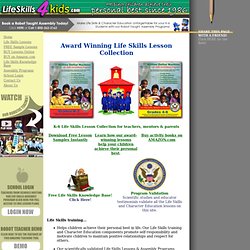
Parenting Skills Worksheets: 4 Parenting Styles. Every grandmother and grandfather will tell you hilarious stories of their children when they were first born.
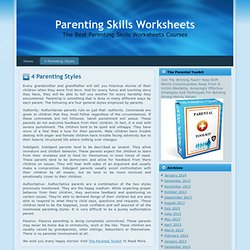
Motivation Tips For Students. Do you need motivation for doing your homework?
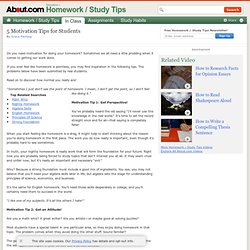
Sometimes we all need a little prodding when it comes to getting our work done. If you ever feel like homework is pointless, you may find inspiration in the following tips. The problems below have been submitted by real students. Read on to discover how normal you really are! “Sometimes I just don’t see the point of homework. For Teens. Teaching Self-Control to Teens. ShareThis When a 2-year-old throws a tantrum, she relies on her parents to soothe her and teach her that tantrums are unacceptable.
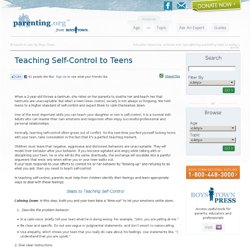
But when a teen loses control, society is not always so forgiving. Awareness of Others - Raising Adolescent Boys. Teenagers are often known for being self-centered. As your son grows, he will learn to realize that there are other people who matter when it comes to making decisions. He'll also need to learn to consider others before he opens his mouth.
Developing a sense of what someone else is thinking or feeling is important. Setting Rules / Expectations and Consequences for Your Teen. Adolescents are very much into the "fairness" concept; that is, they respect and respond to parents, teachers, and other authority figures whom they perceive as being fair. Teenagers are less responsive to parents who they feel do not understand them and treat them in an unfair or unjust way. One of the ways to avoid being perceived as unfair and instead to present yourself to the adolescent as a fair and just person is to establish the rules and the consequences for behavior at the same time. Most parents have a hundred rules and regulations around the house. For example: "Come home at 11:00 P.M. " "Cut the grass.
" When we discipline or try to enforce rules and expectations in this fashion, several things happen. First of all, in this situation, the child does not feel responsible for what has happened to him nor does he feel in control of the consequences of his behavior. The above diagram indicates the way effective rules should be set.